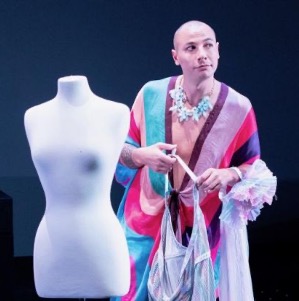By Miranda Aguilar; Directed by Valerie Berry. Riverside Theatres, Parramatta. 18-20 March, 2021.
Reviewed : March 19, 2021.

How many times have you heard those words? Or said them? How many times have you wished someone would say them to you? What do they mean?
Miranda Aquilar uses them ambiguously to title this work that covers the host of insecurities and trepidations that are part of coming-of-age – especially if you are trying to escape a “racist, homophobic and transphobic community”. She says she wrote the play for “every queer person who has been told they need to ‘escape’ Western Sydney … I wanted a work that didn’t say, ‘it gets better,’ but instead tells young people, ‘I know it sucks right now, so I’m going to stay here with you.’”
That’s a big ask, particularly as the ‘young people’ to whom she is reaching out are many and their backgrounds are diverse. But that’s okay, because she’s peopled her play with characters – and actors – who artfully represent that wide diversity. And she’s set the play in the lead up to Mardi Gras, where the group dynamics involved in making costumes and deciding who will carry the flag expose the very different backgrounds of the characters, their strengths and frailties, and their need to feel they belong.
The cast – Gloria Demillo, Brooke Lee, Tommy Misa, Rose Maher and Jemma R Wilks – work through a series of scenes that, though they cover the plethora of fears and anxieties Aguilar obviously understands so well, are peppered gently with humour and affection. Much of this is carried by Tommy Misa’s charismatic style and clever ability to mix empathy and pathos with just the right amount of glitz and glam.

Many themes are inter-related: coming out, getting away, isolation, finding friends, acceptance, rejection, coming home. Demillo and Lee take their characters Val and Thi from school day friendship to late teen acceptance of who they are and who they think they might be. Jemma Wilks is the ‘every-mum’ who worries and fusses but is understanding. Rose Maher manages the turmoil the Mardi Gras preparations.
The set is simple but the constant movement of boxes and the business with superfluous props are distractions that draw out the production unnecessarily. Aguilar makes her point through the dialogue her characters and that’s where the direction should have been centred.
“Everyone deserves to feel safe, loved and accepted. I hope this work feels like home …”
First published in Stage Whispers magazine.